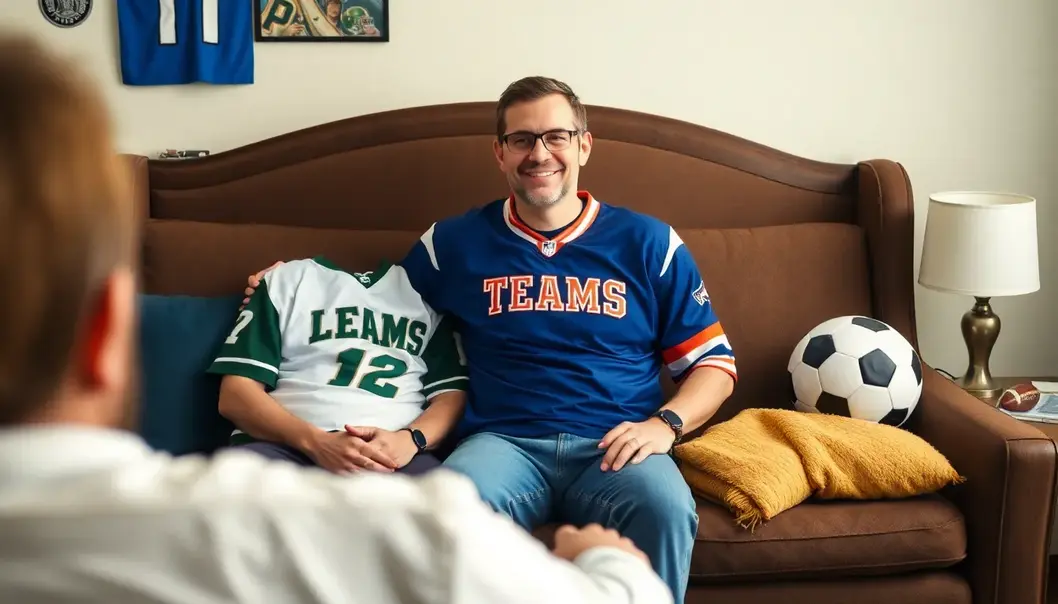Beloved sports fans, if you’ve ever thought therapy is just for those emotionally crushed by life’s curveballs, it’s time to refresh your mental playbook. There are widespread myths surrounding therapy that often mislead even the toughest fans of any game. Beyond the touchline whispers and locker room talk, therapy can be a game-changing strategy that enhances your understanding of the sport—and yourself. Journey with us as we tackle some of the most common misconceptions, helping you strengthen your mental resilience and reignite your passion. Get ready to debunk myths and embrace the supportive role therapy can play alongside your sporty pursuits.
Myth 1: Therapy Is Only for the Weak

The idea that therapy is only for the weak is a stubborn myth that has persisted for decades. This misconception often prevents individuals, including passionate sports fans, from exploring the benefits of mental health support. Let’s challenge this stereotype and understand why mental training is as crucial as physical fitness in the sports world.
First, consider the demands of following intense sporting events and being a dedicated fan. These experiences can evoke a wide range of emotions, from the ecstatic high of a last-minute win to the frustration and disappointment of an unexpected loss. Emotions aren’t just a small part of the game; they are integral to the experience. Just like athletes train their bodies for peak physical performance, fans can benefit greatly from understanding and managing their emotional responses through therapy.
Therapy offers tools and techniques that can strengthen mental resilience, enabling fans to better handle the emotional rollercoaster that comes with sports fandom. This process is not a sign of weakness; rather, it demonstrates a proactive approach to personal growth and emotional intelligence. By debunking the myth that only emotionally fragile individuals seek therapy, we make way for a healthier, more balanced support system that can benefit anyone, regardless of their emotional strength.
Moreover, fans who engage in sports themselves—whether recreationally or competitively—understand the importance of mental preparation. Just as athletes work tirelessly on their physical conditioning, they also train their minds to optimize their performance. Therapy can equip sports enthusiasts with mental strategies like focus, stress relief, and confidence-building, which are critical for achieving both personal and team success.
As discussions evolve around mental health, it’s vital to shift the narrative surrounding therapy. Emphasizing the importance of mental health as a key component of overall wellbeing can encourage more sports fans to embrace therapy, improving not only their mental health but their entire sporting experience. Recognizing that seeking help is a strength, not a weakness, paves the way for a more positive, informed community.
Though this chapter deals with therapy’s benefits for fans, there are parallels with a dog’s training. Navigating the stages of puppy development echoes the idea of steady, consistent growth, reinforcing that development, whether human or canine, requires mental focus as much as physical readiness.
Myth 2: Therapy Doesn’t Benefit Athletes

The misconception that therapy fails to benefit athletes is rooted in a misunderstanding of both therapy and athletics. The truth is, therapy can be invaluable in enhancing an athlete’s mental resilience, focus, and overall performance. This holds true not only for professional athletes but also for fans who engage in sports or active lifestyles.
Athletes face immense pressure to perform at peak levels. They must hone not only their physical skills but also their mental stamina. Therapy equips athletes with tools to manage stress, anxiety, and the fear of failure. By developing these skills, they can maintain focus and composure during high-pressure moments. This mental fortitude often translates into improved performance on the field or court.
Moreover, therapy assists athletes in setting realistic goals and developing detailed plans to achieve them. This strategic approach fosters intrinsic motivation, ensuring that athletes remain driven even through setbacks or plateaus. For sports enthusiasts who take part in amateur or recreational activities, learning these techniques can amplify enjoyment and success in their own pursuits.
Injury is another significant aspect where therapy plays a critical role. Physical injuries lead to frustrated athletes spending significant time away from their sport, which can result in a negative mindset. Therapy helps navigate these emotional challenges, providing coping strategies and fostering resilience during recovery periods.
Beyond individual benefits, therapy also enhances team dynamics. Communication and empathy are crucial for a thriving team environment. Athletes who engage in therapy often bring improved interpersonal skills back to their teams, leading to better collaboration and understanding among teammates.
In summary, therapy offers profound advantages not just to elite athletes but to anyone with an active lifestyle. It strengthens mental agility, enhances performance under pressure, and promotes personal growth, thereby debunking the myth that therapy doesn’t benefit athletes.
For additional insights into managing activity and performance, consider visiting Long-Nosed Lovelies: Exploring the Charm of Dogs with Distinctive Snouts, which might not only give you a fresh perspective on resilience but also a delightful read.
Final words
As sports fans, embracing the gradient of emotions in both victory and defeat can be enriching. Therapy isn’t about weakness; it’s about building strength, much like training muscles or sharpening a skill. As you cheer passionately for your teams, remember that mental wellness is a cornerstone of enduring success. Therapy is a tool to help manage life’s challenges, making you not just a better fan, but a stronger individual.
Explore how therapy can support your sports passion and personal growth by visiting our website.
Learn more: https://www.therapysupportforsportsfans.com
About us
Therapy Support for Sports Fans offers personalized therapy sessions that cater to sports enthusiasts, helping bridge the gap between passion for sports and mental wellness. Our experienced therapists tailor sessions to enhance mental resilience, focus, and overall well-being, ensuring fans are equipped to conquer personal and athletic challenges.



